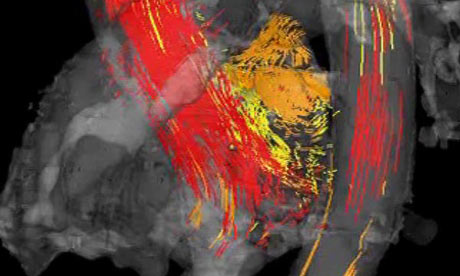
It didn't take long for opponents of US healthcare reform to morbidly use Bill Clinton's heart problems for political capital. That's distaseful enough, but even more so when they can't get their facts straight.
As was widely reported, former president Clinton yesterday had two stents inserted into one of his coronary arteries. It's a relatively routine if still serious event for someone, such as Clinton, who had angioplasty in 2004. But the spectre of an ill Democratic president who himself attempted to reform healthcare was just too tempting a target for some.
First up, here's James Pinkerton in a long polemic reposted on Fox News's website:
Former President Bill Clinton, now in a New York City hospital room, under observation for chest pains, might be thinking to himself that it's a good thing that Clintoncare didn't pass in the early 90s. If it had, it's a safe bet that the sort of technological innovation that is keeping him alive tonight would never have advanced as far as it has.
Is James Pinkerton saying here that "it's a safe bet" Bill Clinton would have died if the healthcare reforms his administration were proposing in the 1990s had been passed? Let's hope not. But Pinkerton's major point – that Clinton would not have received as much treatment or benefitted from technological advances – is demonstrably false, if the experience of national healthcare systems such as those in Japan, France, Canada, Sweden, Britain or Germany are a proxy for the type of reforms that the Clintons were proposing.
Blogger Michelle Malkin sent Clinton best wishes for a speedy recovery – a huge improvement over Pinkerton's ghoulishness – but then went on to write:
Now, a timely reminder: Stents don't grow on trees. They were not created, developed, marketed, or sold by government bureaucrats and lawmakers.
Stents don't fall from the skies, either. Stents, like most technological advances, are the product of a series of small steps and piecemeal breakthroughs spread over decades. As it happens, the techniques of balloon angioplasty were pioneered by Andreas Gruentzig, a German doctor working in a Swiss hospital. The first stent in a human coronary artery was implanted by two French doctors, in Toulouse. The first commercial stents were developed by Julio Palmaz, an Argentine working at the University of Texas and Richard Schatz, working at a US Army hospital, and tested in Germany and Brazil. Unravelling the superiority of any one form of healthcare from that polyglot collection is impossible – which shows how foolish it is to try to score political points from such a situation.
Malkin goes on to say: "One of the nation's top stent manufacturers, Boston Scientific, has weighed in on the Democrats' proposed massive taxes on medical device makers," and quotes from the company's chief executive complaining about the tax proposal and predicting the company would have to cut research as a result. Which is ironic – because the licence to the first commercial stents were offered to Boston Scientific but the company turned it down. In fact, backing for Palmaz's work came from the founder of the Fuddruckers burger chain, not the US healthcare system. (Clinton is famous for his love of hamburgers, so there's a neat circle.) Gruentzig developed his balloons in his kitchen, Palmaz made a breakthrough in his garage.
What has all this got to do with Bill Clinton's heart trouble and reforming the US healthcare system? Nothing, and that's the way it should be.

